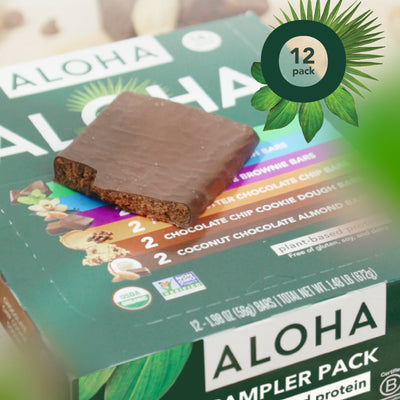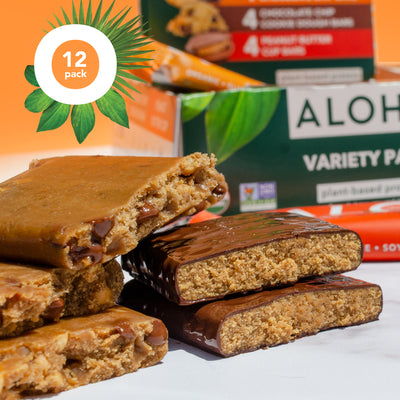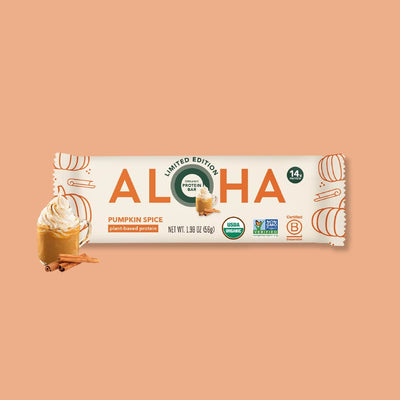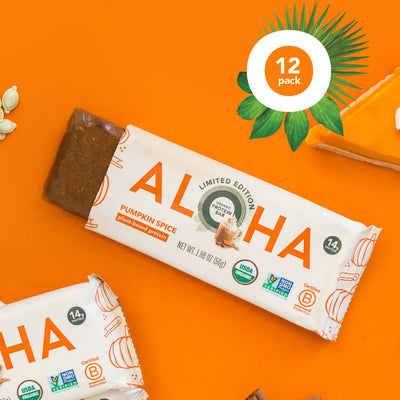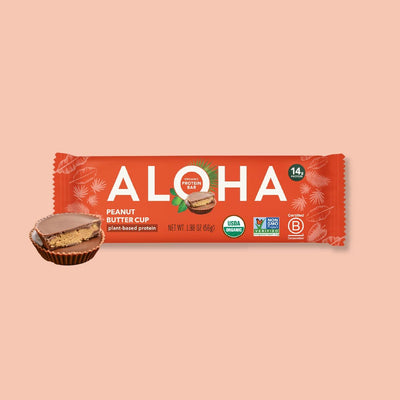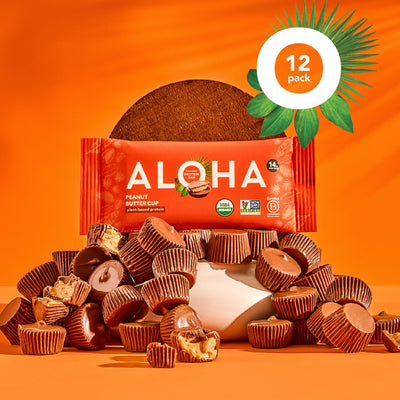Key Takeaways:
- Function: Creatine supports high-intensity performance, while protein powder aids recovery and daily nutrition.
- Compatibility: You don’t have to choose — creatine and protein powder can be used together to support different parts of your fitness routine.
- Clean Choice: ALOHA offers soy-free, plant-based protein powders that prioritize simple ingredients, sustainability, and real nourishment.
As a Certified B Corporation and proud employee-owned company, ALOHA has always done things differently. We believe that nourishing your body should feel good, taste good, and do good — for you, your community, and the planet. Our plant-based, soy-free protein products are made with ingredients you can trust and values you can stand behind.
When it comes to supporting your body through movement, recovery, and everyday wellness, there's a lot of noise out there — especially around supplements like creatine and protein powder. At a glance, they might seem similar. After all, both are often talked about in fitness spaces and scooped into gym bags. But they do very different things for your body, and understanding those differences is key to making the right choice for your routine.
In this piece, we’ll be discussing the differences between creatine and protein powder, when to use them, and how to choose what works best for your body and lifestyle.
What Is Creatine?
Creatine is a natural substance found in your muscles and brain. Your body makes it on its own, and you can also get it from certain foods like red meat and seafood. Many people take it as a supplement to support short bursts of strength and energy — especially during high-intensity workouts like lifting weights or sprinting.
While creatine is popular among athletes and fitness enthusiasts, it’s not a source of protein. It doesn’t help build muscle the way protein powder does — instead, it helps fuel your muscles so you can push a little harder during exercise.
Benefits Of Creatine
Creatine is one of the most researched supplements out there, and many people use it to support physical performance. Here are some of the key benefits it may offer:
Supports Short-Term Muscle Energy
Creatine helps your muscles quickly regenerate a compound called ATP (adenosine triphosphate), which is your body’s main source of energy during quick, explosive movements. This makes creatine especially helpful for activities like sprinting, jumping, or heavy lifting — where every bit of short-term energy counts. While it won’t directly build muscle, it may help you perform better during those high-intensity workouts.
May Help With Muscle Recovery
Some studies suggest creatine may help support muscle recovery by reducing inflammation and muscle cell damage after intense workouts. This doesn’t mean you’ll bounce back instantly, but it might help with how your body handles repeated, strenuous training sessions. Over time, this could lead to more consistent progress in your fitness routine.
Helps You Train Harder
By improving your body’s energy availability, creatine can help you push through fatigue and get more out of your workouts. That might mean lifting heavier weights, adding a few extra reps, or recovering more quickly between sets. Over time, this added effort may translate into better results, especially if your training style relies on short bursts of effort.
What Is Protein Powder?
Protein powder is a convenient way to add more protein to your diet — especially when you’re on the go or recovering after a workout. It’s made by extracting protein from sources like plants, milk, or eggs, and then drying it into a fine powder that can be mixed into drinks or recipes.
At ALOHA, our protein powders are entirely plant-based, soy-free, and made with ingredients you can feel good about. Whether you’re blending it into a smoothie, mixing it with water, or baking it into your favorite snacks, it’s a simple way to support your daily protein needs — without relying on processed or artificial ingredients.
And if you're wondering about the difference between protein powder and protein shakes, you can check it out from us.
Benefits of Protein Powder
Protein is essential for everyday health, and adding a high-quality protein powder to your routine can offer a few key benefits — especially if you live an active lifestyle or follow a plant-based diet.
Supports Muscle Repair And Recovery
After a workout, your muscles need protein to repair and rebuild. Protein powder makes it easy to get that support quickly — especially when you're short on time. A plant-based option like ALOHA’s gives your body what it needs, without any added soy or artificial stuff.
Helps You Feel Full
Protein is naturally satisfying, which can help you feel more full between meals. A shake made with protein powder can be a great way to stay nourished when you're on the go or between meals. It’s also a helpful option for anyone trying to build a balanced, filling snack without relying on ultra-processed foods.
A Convenient Way To Get More Protein
Not everyone has the time to cook protein-rich meals every day. Protein powder gives you a quick and easy way to fill the gap — whether you're mixing it into oatmeal, blending it with fruit, or simply shaking it with your favorite liquid. Curious about what to mix it with?Here are some simple ideas on what to mix protein powder with.
What’s The Difference Between Creatine And Protein Powder?
Creatine and protein powder are both popular in the wellness space, but they serve very different purposes. Understanding what each one does can help you choose what’s right for your goals.
Creatine supports short bursts of physical performance. It helps your muscles produce quick energy, which is especially useful during high-intensity training like weightlifting or sprinting. But it doesn’t provide your body with any protein — so it’s not a muscle-building nutrient on its own.
Protein powder, on the other hand, gives your body the actual building blocks it needs to repair and grow muscle. It’s useful after workouts, between meals, or anytime you need a clean, plant-based protein source. Think of it as nourishment for your body, not a performance booster like creatine.
Which One Should You Take?
Choosing between creatine and protein powder comes down to what you’re looking to support in your daily routine.
If you're focused on performance and power during high-intensity workouts, creatine might be a helpful addition. It's commonly used by people who lift heavy, train in short bursts, or want to boost their strength training sessions.
If you're looking to support muscle recovery, maintain energy between meals, or simply add more plant-based nutrition to your day, protein powder is the better fit. It’s also a smart option if you're trying to stay full longer or balance your diet without relying on animal products.
Of course, these two aren’t rivals — you don’t have to pick one over the other. Many people use both for different reasons, depending on their activity level and nutrition goals.
At ALOHA, our plant-based protein powders are crafted to support everyday wellness — not just workouts. They're soy-free, made with good ingredients, and taste great in smoothies, oats, or even baked goods. Try our Chocolate or Vanilla blends to keep your body nourished in a way that feels natural and sustainable.
Can You Take Creatine And Protein Powder Together?
Yes, you can absolutely take creatine and protein powder together — and many people do. Since they work in different ways, there’s no conflict between the two. In fact, combining them may help support both performance and recovery, depending on your routine.
You might take creatine before your workout to help power your training, and then reach for a protein shake afterward to refuel and support muscle repair. The two don’t cancel each other out, and they don’t need to be taken at the same exact time to be effective.
The key is choosing products that support your values and your body. At ALOHA, we focus on plant-based, soy-free protein powders made from real ingredients — so you can fuel up without second-guessing what's in your shake.
How To Choose A Good Protein Powder
Not all protein powders are created equal. Some are packed with fillers, artificial flavors, or ingredients that can leave you feeling sluggish instead of supported. Here are a few things to look for when choosing a protein powder that works for your body and lifestyle:
Clean Ingredients You Recognize
Look for protein powders made with whole-food ingredients — not long lists of things you can’t pronounce. ALOHA’s plant-based protein powders are made with organic ingredients and no artificial sweeteners, flavors, or dyes, so you know exactly what you’re getting.
Soy-Free And Dairy-Free Options
Some protein powders use soy or whey, which might not work for everyone. ALOHA is proudly soy-free, dairy-free, and 100% plant-based, making it a great choice for those with sensitivities or those avoiding animal products.
Balanced Nutrition
A great protein powder does more than just deliver grams of protein — it also supports your overall wellness. ALOHA protein powders include real food ingredients like pumpkin seeds, peas, and brown rice for a complete amino acid profile and a smooth, satisfying taste.
Certifications That Matter
Trustworthy brands are transparent about what goes into their products. ALOHA is an employee-owned, Certified B Corp, which means we’re committed to people and the planet — not just profits. Every scoop supports something bigger.
The ALOHA Difference
At ALOHA, we believe that nourishing your body should feel good — and do good. That’s why our protein powders are made with real, plant-based ingredients, without the soy, artificial sweeteners, or synthetic additives found in many other options.
We’re proud to be an employee-owned company and a Certified B Corp, which means we hold ourselves to high standards not just in what we make, but in how we operate. From sourcing responsibly to giving back to communities and protecting the planet, we aim to make choices that support a better world.
Our Chocolate and Vanilla protein powders are easy to mix, great in taste, and designed for real life — whether you’re post-workout, between meetings, or out the door with a smoothie in hand.
Because at ALOHA, it’s not just about what’s in the scoop — it’s about how it makes you feel, and what it supports along the way.
Final Thoughts
When it comes to creatine vs. protein powder, it’s not about choosing a winner — it’s about understanding what your body needs and how each one fits into your routine. Creatine can help fuel your performance during short, intense workouts, while protein powder supports recovery and daily nourishment.
If you're looking for a clean, plant-based protein source you can feel good about, ALOHA has you covered. Our soy-free protein powders are made with ingredients you can trust, and they support more than just your body — they support communities, the planet, and a healthier way forward.
Whichever path you take, the most important thing is choosing products that make you feel good, inside and out.
Read also:
- Benefits Of Superfoods: Why They Boost Your Health
- Superfood Recipes: Easy And Healthy Meal Ideas
- How Long Does Protein Stay In Your System? Key Facts
Frequently Asked Questions About Creatine Vs. Protein Powder
Can creatine replace protein powder in my diet?
No — creatine cannot replace protein powder. While it helps with short bursts of performance, it doesn’t provide the protein your body needs for repair, recovery, or daily nourishment.
Is creatine suitable for people who don’t work out?
Creatine is most beneficial during high-intensity activity. If you don’t engage in regular workouts or strength training, you likely won’t see much impact from using it.
Do plant-based eaters need to avoid creatine?
Most creatine supplements are synthetically made and do not contain animal products, so they’re generally vegan-friendly. Still, it’s a good idea to check the label for additives or fillers.
Does creatine help with endurance activities like running or cycling?
Creatine supports quick bursts of power, not long-lasting energy. Endurance athletes may not see the same benefits from creatine as those doing strength or sprint-based workouts.
Can I take creatine on rest days?
Yes, many people continue to take creatine on rest days to maintain consistent levels in their muscles. It’s not just a pre-workout supplement — consistency matters.
How long should I take creatine before seeing results?
Some people notice performance improvements in a week, while others may take longer. Effects can depend on your body, training style, and whether you're taking it daily.
Is protein powder necessary if I already eat a high-protein diet?
Not always. If you’re getting enough high-quality protein from whole foods, you may not need a supplement. But protein powder is a helpful option when meals fall short.
What’s the best time to take protein powder?
There’s no “one best time” — it depends on your routine. Many people take it post-workout, but it’s also great as a breakfast boost or midday snack.
Can I mix creatine and protein powder in the same shake?
Yes, it’s totally fine to mix them. Just make sure the liquid and flavor combinations work well together for a smooth, enjoyable shake.
Do either creatine or protein powder help with weight loss?
Neither is a direct weight-loss product. However, protein may help with satiety, and creatine may support your performance in workouts, which could assist your overall wellness goals.






